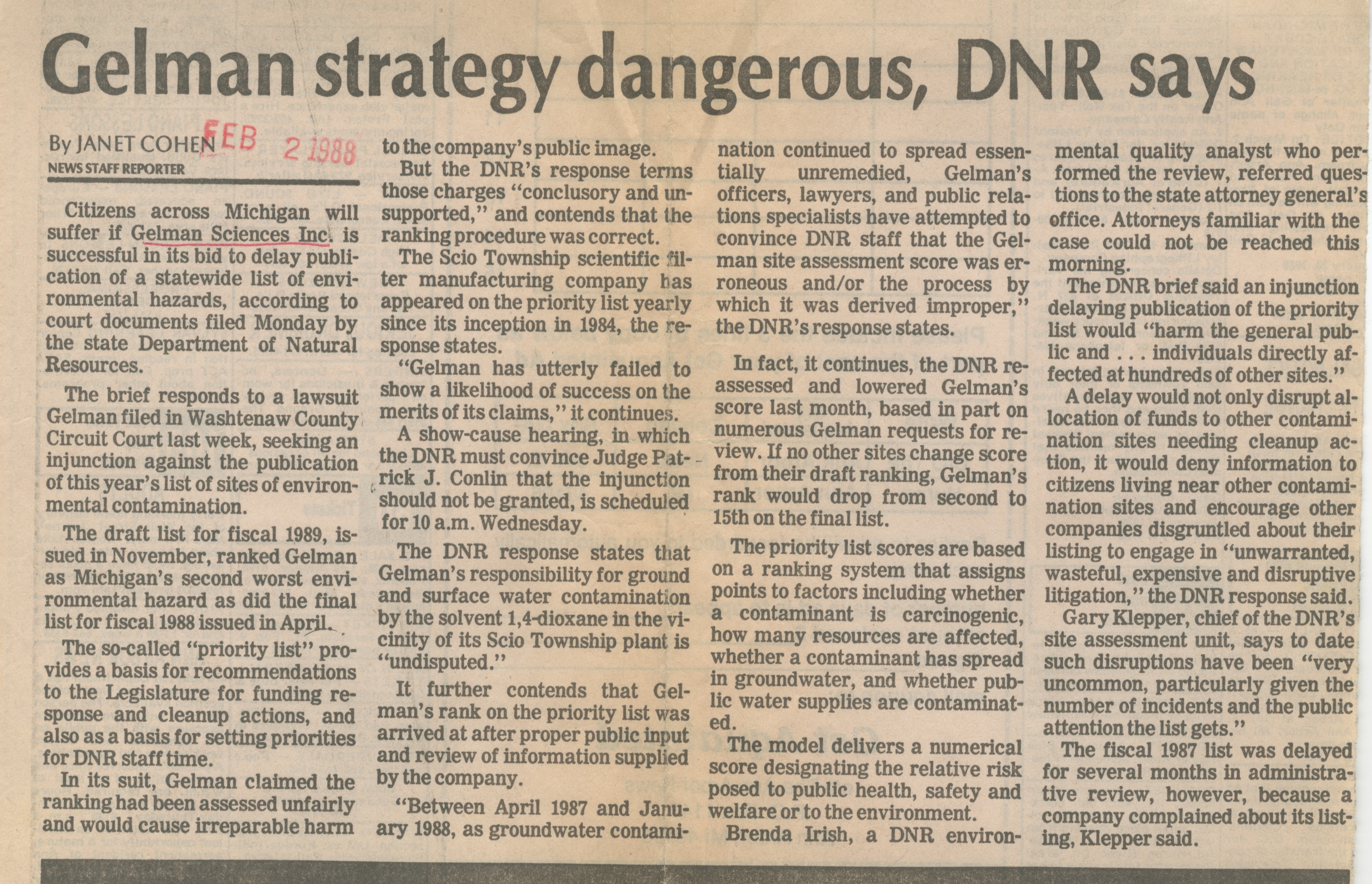Gelman Strategy Dangerous, DNR Says

Gelman strategy dangerous, DNR says
By JANET COHEN
NEWS STAFF REPORTER
Citizens across Michigan will suffer if Gelman Sciences Inc, is successful in its bid to delay publication of a statewide list of environmental hazards, according to court documents filed Monday by the state Department of Natural Resources.
The brief responds to a lawsuit Gelman filed in Washtenaw County Circuit Court last week, seeking an injunction against the publication of this year’s list of sites of environmental contamination.
The draft list for fiscal 1989, issued in November, ranked Gelman as Michigan’s second worst environmental hazard as did the final list for fiscal 1988 issued in April.
The so-called “priority list” provides a basis for recommendations to the Legislature for funding response and cleanup actions, and also as a basis for setting priorities for DNR staff time.
In its suit, Gelman claimed the ranking had been assessed unfairly and would cause irreparable harm to the company’s public image.
But the DNR’s response terms those charges “conclusory and unsupported,” and contends that the ranking procedure was correct.
The Scio Township scientific filter manufacturing company has appeared on the priority list yearly since its inception in 1984, the response states.
“Gelman has utterly failed to show a likelihood of success on the merits of its claims,” it continues.
A show-cause hearing, in which the DNR must convince Judge Patrick J. Conlin that the injunction should not be granted, is scheduled for 10 a.m. Wednesday.
The DNR response states that Gelman’s responsibility for ground and surface water contamination by the solvent 1,4-dioxane in the vicinity of its Scio Township plant is “undisputed.”
It further contends that Gelman’s rank on the priority list was arrived at after proper public input and review of information supplied by the company.
“Between April 1987 and January 1988, as groundwater contamination continued to spread essentially unremedied, Gelman’s officers, lawyers, and public relations specialists have attempted to convince DNR staff that the Gelman site assessment score was erroneous and/or the process by which it was derived improper,” the DNR’s response states.
In fact, it continues, the DNR reassessed and lowered Gelman’s score last month, based in part on numerous Gelman requests for review. If no other sites change score from their draft ranking, Gelman’s rank would drop from second to 15th on the final list.
The priority list scores are based on a ranking system that assigns points to factors including whether a contaminant is carcinogenic, how many resources are affected, whether a contaminant has spread in groundwater, and whether public water supplies are contaminated.
The model delivers a numerical score designating the relative risk posed to public health, safety and welfare or to the environment.
Brenda Irish, a DNR environmental quality analyst who performed the review, referred questions to the state attorney general’s office. Attorneys familiar with the case could not be reached this morning.
The DNR brief said an injunction delaying publication of the priority list would “harm the general public and ... individuals directly affected at hundreds of other sites.”
A delay would not only disrupt allocation of funds to other contamination sites needing cleanup action, it would deny information to citizens living near other contamination sites and encourage other companies disgruntled about their listing to engage in “unwarranted, wasteful, expensive and disruptive litigation,” the DNR response said.
Gary Klepper, chief of the DNR’s site assessment unit, says to date such disruptions have been “very uncommon, particularly given the number of incidents and the public attention the list gets.”
The fiscal 1987 list was delayed for several months in administrative review, however, because a company complained about its listing, Klepper said.
Article
Subjects
Janet Cohen
Pall Gelman Dioxane Groundwater Contamination Cleanup History
Michigan Department of Natural Resources (DNR)
Groundwater Contamination
Gelman Sciences Inc.
Gelman Lawsuits
Dioxane Plume
Courts - Washtenaw County
Old News
Ann Arbor News
Patrick J. Conlin
Gary Klepper
600 S Wagner Rd